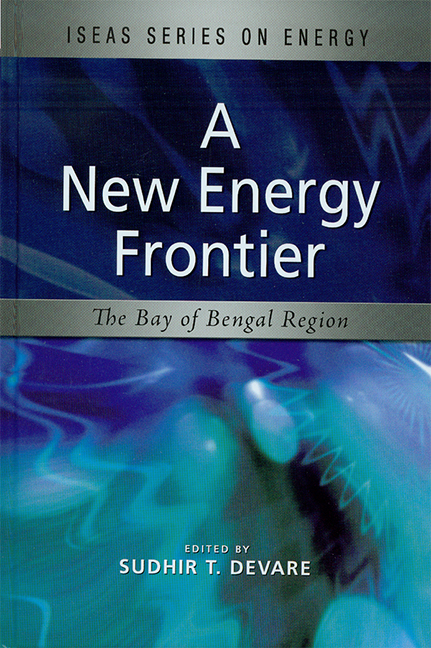Book contents
- Frontmatter
- Content
- Foreword
- Message from the Director
- Preface
- The Contributors
- 1 An Overview of the Energy Scene in the Bay of Bengal Region
- 2 Current and Expected Energy Production and Consumption within the Bay of Bengal Region: A Synopsis
- 3 Gas Potential at the Bay of Bengal and Implications for India's Energy Security
- 4 Macroeconomic Challenges for the Growth of the Energy Sector in Bangladesh in the Context of Regional Integration
- 5 Energy in the Bay of Bengal Region: Myanmar's Perspective
- 6 Marine-related Energy Resources in the Eastern Indian Ocean: Indonesian Perspective
- 7 Energy Trading and Singapore's Role as a Hub
- 8 Bay of Bengal: Awakening of a Potential Giant Area
- 9 Energy Transportation Security in the Bay of Bengal
- 10 Ethical Business Practice or Camouflage? Energy and Mining Companies and Corporate Social Responsibility
- 11 Sustainable and Renewable Energy: Scenarios for the Future
- Index
Foreword
Published online by Cambridge University Press: 21 October 2015
- Frontmatter
- Content
- Foreword
- Message from the Director
- Preface
- The Contributors
- 1 An Overview of the Energy Scene in the Bay of Bengal Region
- 2 Current and Expected Energy Production and Consumption within the Bay of Bengal Region: A Synopsis
- 3 Gas Potential at the Bay of Bengal and Implications for India's Energy Security
- 4 Macroeconomic Challenges for the Growth of the Energy Sector in Bangladesh in the Context of Regional Integration
- 5 Energy in the Bay of Bengal Region: Myanmar's Perspective
- 6 Marine-related Energy Resources in the Eastern Indian Ocean: Indonesian Perspective
- 7 Energy Trading and Singapore's Role as a Hub
- 8 Bay of Bengal: Awakening of a Potential Giant Area
- 9 Energy Transportation Security in the Bay of Bengal
- 10 Ethical Business Practice or Camouflage? Energy and Mining Companies and Corporate Social Responsibility
- 11 Sustainable and Renewable Energy: Scenarios for the Future
- Index
Summary
This volume is of special relevance for a number of very pertinent reasons. Firstly, the nations of South and Southeast Asia are going through rapid economic change, particularly with India having registered very healthy rates of growth over the last five years or so. At the same time the Asian economic crisis of a decade ago has now become history, and the countries of the region are now making rapid progress in every sector of their economies. But one important area, which could influence economic growth and development in either direction is the issue of energy which, given the dependence of the region on oil imports and prevailing high prices of oil, does introduce an element of uncertainty about the future.
The editor is particularly well qualified to write on the subject of energy and related issues in the Bay of Bengal region. While the countries of the region have clear opportunities for mutually beneficial cooperation in the field of energy, the success of any effort in this direction would hinge on diplomatic initiatives and the history of relationships between the countries of the region. There are also compelling domestic factors that would influence cooperation in the future, such as the ability of Myanmar to open up its hydrocarbon sector to foreign investments and trade. Similarly, in the case of Bangladesh, the possibility of export of natural gas to India or even the provision of a transit pipeline to allow gas from Myanmar to be supplied to India became an emotional issue several years ago. Diplomacy has to take political realities into account if progress has to be achieved with regional initiatives in areas such as energy. The BIMSTEC region has been grappling with possibilities of closer cooperation in energy trade in recent years but without notable success. Hence the need for some “out of the box” thinking and action.
The book effectively makes the point that the Bay of Bengal region holds a total population of 1.5 billion people, which in a relatively small area of land contains one quarter of humanity. While hydrocarbons are produced in the countries of this grouping, it is not a major oil and natural gas producing region of the world.
- Type
- Chapter
- Information
- A New Energy FrontierThe Bay of Bengal Region, pp. vii - viiiPublisher: ISEAS–Yusof Ishak InstitutePrint publication year: 2008



